Why Won't My Bearded Dragon Eat?

It can be concerning when your bearded dragon suddenly stops eating - especially if you’re not sure what’s causing the change. Bearded dragons are generally good eaters, so a lack of appetite is usually a sign that something’s off. The good news is that most feeding issues have identifiable causes, and once you figure out what’s wrong, you can usually correct it. Here’s what to consider if your bearded dragon won’t eat.
Improper Tank Conditions
One of the most common reasons for appetite loss is incorrect temperatures or lighting inside the enclosure. Bearded dragons rely on external heat to digest their food. If the basking area is too cool, their metabolism slows down, and they may stop eating altogether.
Make sure your setup includes:
- A basking area between 95–110°F
- A cool side around 75–85°F
- Proper UVB lighting, replaced every 6 to 12 months depending on the type
UVB light is essential for synthesizing vitamin D3, which helps them absorb calcium. Without it, bearded dragons can develop serious health issues, including loss of appetite.
Environmental Stress
Bearded dragons can react strongly to changes in their environment. A new tank setup, a move to a different room, or the presence of new pets can all cause stress. Even loud household noises or frequent handling can be unsettling.
Signs of stress may include:
- Hiding more often
- Darkened beard
- Skittish or defensive behavior
Try to keep their environment calm and consistent. Offer hiding spots, maintain a stable routine, and give them time to adjust if changes have recently occurred.
Brumation
Brumation is a natural dormancy period that some bearded dragons enter during the cooler months, especially as adults. During brumation, it’s normal for dragons to become less active, sleep more, and refuse food for extended periods.
If your dragon is otherwise healthy and it’s late fall or winter, brumation may be the reason for the appetite loss. Still, it’s a good idea to check with a reptile vet before assuming that’s the cause, especially if you’re seeing other symptoms.
Illness or Parasites
A sudden lack of appetite can be a sign of an underlying health issue. Common medical causes include:
- Internal parasites
- Respiratory infections
- Metabolic bone disease
Watch for other signs such as lethargy, unusual stools, weight loss, or visible swelling. If anything seems off, don’t wait - book an appointment with a reptile-savvy veterinarian. A proper diagnosis is the first step to getting your dragon back on track.
Diet Boredom or Imbalance
Sometimes, the issue is simply that your dragon is bored with its food. Juveniles need more insects, while adults should get a diet richer in greens and vegetables. If they’ve been fed too many fatty treats, like superworms, they might start ignoring healthier foods.
Offer variety:
- Feeder insects like crickets, dubia roaches, or mealworms
- Leafy greens such as collard, mustard, or dandelion greens
- Occasional fruits or treats in moderation
Avoid overfeeding high-fat or sugary foods, as these can cause picky eating habits.
By checking your tank setup, watching for stress or illness, and offering a balanced, interesting diet, you can often identify and resolve feeding issues quickly. If something still doesn’t seem right, don’t hesitate to reach out to a qualified reptile vet. A little attention to detail goes a long way toward keeping your bearded dragon healthy and thriving.

A proud mama to seven dogs and ten cats, Angela spends her days writing for her fellow pet parents and pampering her furballs, all of whom are rescues. When she's not gushing over her adorable cats or playing with her dogs, she can be found curled up with a good fantasy book.
More by Angela Vuckovic

























